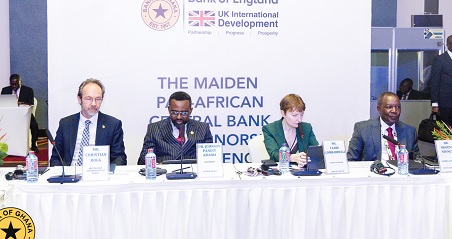
BoG attributes economic rebound to disciplined reforms
The Governor of the Bank of Ghana (BoG), Dr Johnson Pandit Asiama, has described the country’s remarkable economic rebound as evidence that credibility, transparency and disciplined policy reforms can restore confidence and stability, even after a severe financial crisis.
Addressing fellow central bank governors at the opening of a maiden Pan-African Central Bank Governors’ conference in Accra on Monday, Dr Asiama recalled that some three years ago the nation was gripped by what the World Bank described as a homegrown crisis.
"Inflation had soared to 54.1 per cent, the cedi had lost half of its value, and reserves had plunged to less than one month of import cover.
“When my team and I assumed office in 2025, we decided to adopt a single focus — stabilisation.
We tightened policy, sterilised excess liquidity and spoke frankly to the public, the markets and the citizens alike,” he said.
Event
The two-day high-level conference is being hosted by the Bank of Ghana, in partnership with the Bank of England and the UK Foreign, Commonwealth and Development Office (FCDO).
The event, which is on the theme: “Central bank governance: Leadership, credibility, and resilience in African central banking,” seeks to facilitate peer-to-peer learning on leadership, decision-making and institutional credibility within the African central banking community.
It is being attended by leaders from 23 African central banks who are discussing effective governance, policy independence and regional financial resilience.
They included the British High Commissioner to Ghana, Dr Christian Rogg; Deputy Governor, Monetary Policy at Bank of England, Clare Lombardelli; First Deputy Governor, BoG, Dr Zakari Mumuni, and Second Deputy Governor, BoG, Matilda Asante-Asiedu.
Proof of principle
Dr Asiama explained that the results of BOG’s efforts was “proof of principle" as the country’s inflation had now fallen to eight per cent, marking the first single-digit rate since 2021.
He said the nation’s international reserves had risen to $11 billion, covering about 4.8 months of imports as of September 2025.
"Meanwhile, the cedi has appreciated by over 34 per cent year-to-date, reversing last year’s depreciation. Our stability is real, but it is still young — it is still being tested,” he added.
Dr Asiama further said that sustained fiscal discipline and credible communication were key to preserving the gains in the economy.
He urged fellow African governors to remain resolute in their reform efforts and to learn from one another’s experiences.
“Credibility and patience work. The real test of leadership is to stay the course when the path is least certain,” the Governor said.
The British High Commissioner to Ghana, Dr Rogg, underscored the fact that regional cooperation among African central banks had become indispensable in navigating shared economic challenges such as inflation, debt pressures and global market uncertainty.
He observed that since the partnership between the Bank of Ghana and the Bank of England was established in 2015, it had evolved into a powerful model of knowledge exchange rather than one merely based on aid or infrastructure.
Dr Rogg said that through joint efforts in areas ranging from micro-financial management to vaccine logistics, both institutions had demonstrated how collaboration could drive resilience and reforms within the continent’s financial systems.
He praised the growing spirit of peer learning among central banks, saying that such cooperation allowed countries to adopt innovative solutions to complex policy questions with the support of global experts.
For her part, Ms Lombardelli said that the long-standing collaboration between the Bank of England and the Bank of Ghana continued to thrive through shared knowledge, research partnerships and training programmes that addressed pressing economic and regulatory challenges.
She said through initiatives such as the UK and international market funding programmes and workshops hosted by the Centre for Sustainable Development Studies, the Bank of England sought to deepen its engagement with central banks and financial regulators across the Global South.
